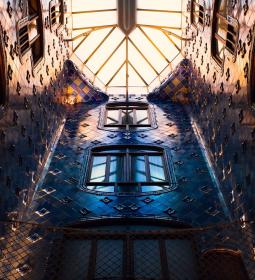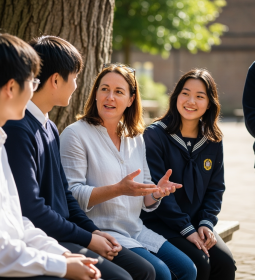In 2014, a prestigious award known as the Teachers' Peace Prize appeared in the educational sphere, popularly called the Nobel Prize for Teachers. This award was created by Sunny Varkey, a well-known businessman from the United Arab Emirates, together with his charitable foundation, the Varkey Foundation. The aim of this initiative was to raise the status and recognition of the teaching profession at the international level.
The essence of the award
The selection of candidates for the award is carried out by a jury: they are looking for teachers around the world who apply innovative teaching methods and have a significant impact on their students and society as a whole.
The winner of the Global Teacher Prize receives a prize of $1 million. At the same time, the laureate must continue his pedagogical activity in the same school for at least five years after the award.

Teachers can take part in the competition and compete for the title of the best teacher in the world every year - applications are usually accepted until the end of September. The winners are teachers from different countries, and the story of each of them is interesting and instructive.
Hanan Al Hroub
Hanan Al Hroub, who grew up in a Palestinian refugee camp in Bethlehem, was unable to realize her dream of becoming a translator because of the conflict. Subsequently, she married and became the mother of five children, but her life suddenly changed after a tragic incident: the car in which her husband Omar was carrying his daughters was fired upon at the border. Although the physical injuries were not serious, the girls experienced a deep psychological shock. Neither Hanan nor Omar could find a way to help their children cope with the nightmare, and the school did not offer the support they needed.

After the tragedy, Hanan made the decision to become a teacher to help the children maintain the carefree childhood even in the hellish conditions of wartime. Her approach to education is based on the principle of non-violence, and she actively works to help students overcome internal conflicts and psychological trauma. Hanan uses unusual techniques, such as a clown costume, to show children that the world can be a friendly and safe place.
She invested the funds received from the award in the construction of an educational academy for teachers.
Andria Zafirakou
Alperton School, located in one of London's most disadvantaged areas, mainly accepts migrant children. The living conditions of these families are modest, often several families share the same kitchen and bathroom, just like in Soviet communal apartments.
Andria Zafirakou, an art teacher at Alperton, has been developing tailored approaches to teaching children for 17 years. She learned basic expressions in dozens of languages to facilitate communication with each student, which allowed her to connect not only with the children, but also with their families – she personally visited the homes of the wards and built friendships with the parents.

Understanding the unique needs of immigrant families, Andria overhauled traditional educational methods: she introduced sports clubs for girls from conservative families, organized extracurricular activities on weekends, and provided free breakfasts. Moreover, she changed the school curriculum, reducing the number of theoretical subjects in favor of practice. Zafiraku also included more creative disciplines, believing that this contributes to the development of critical thinking and social skills in children.
It is more difficult for children from other countries to study in school if the system does not take into account the peculiarities of their culture. Zafiraku disagrees with the popular belief that children should be immersed in the culture of their country of residence: she believes it is important to help students understand their own cultural identity first. In her opinion, awareness of their roots, history and culture is the key to instilling in children a sense of pride in their homeland.
Nancy Atwell
Nancy Atwell, an avid lover of books, has always dreamed of a career as a teacher of English and literature. Her first experience of teaching at a school in western New York, however, did not live up to expectations: eighth-grade students remained indifferent to the school curriculum, and her innovative teaching methods did not produce the expected results.
In search of new approaches to learning, Nancy moved to Edgecombe, Maine, where she founded her own education center. Over time, she realized an important thing: children know best what they want to read, and there is no need to interfere with this process with tests and checks—it is counterproductive. In her opinion, modern educational requirements have turned teachers into "test preparation machines."

About a hundred children from the first to the eighth grade study in its center. This center differs significantly from traditional American schools: there are no standardized tests, class sizes are smaller than usual, and each class has its own library. Instead of traditional tests, students are engaged in creative projects and experiments. The school celebrates various religious and secular holidays from around the world, such as the Chinese New Year and the end of Ramadan, which helps to broaden the horizons of students. Each student reads an average of 40 books a year, and the school has compiled a list of recommended books for seventh- and eighth-graders. The Atwell School became a model of innovation in American education, and Nancy herself became the author of nine professional books for teachers.
Maggie McDonnell
Maggie McDonnell, a teacher from Nova Scotia, has chosen an unusual and challenging place for her work: she works in the village of Salluit, located in the Inuit community of Northern Quebec, within the Arctic Circle. This remote region can only be reached by air, and winter temperatures can easily drop to -25 degrees Celsius and below. Nevertheless, McDonnell has been teaching here for more than 15 years. The difficult living conditions of the local population, including high unemployment and social problems such as alcoholism and drug addiction, make the work of teachers especially important here.

Raised by her father to be respectful of Indigenous people, Maggie always remembered his words that the people of Nova Scotia were visitors to Inuit land. She remembered these lessons when she received the prestigious Global Teacher Prize: using a portion of her prize money, Maggie organized kayaking training for young Inuit, a traditional pastime of the people that was at risk of being forgotten.










